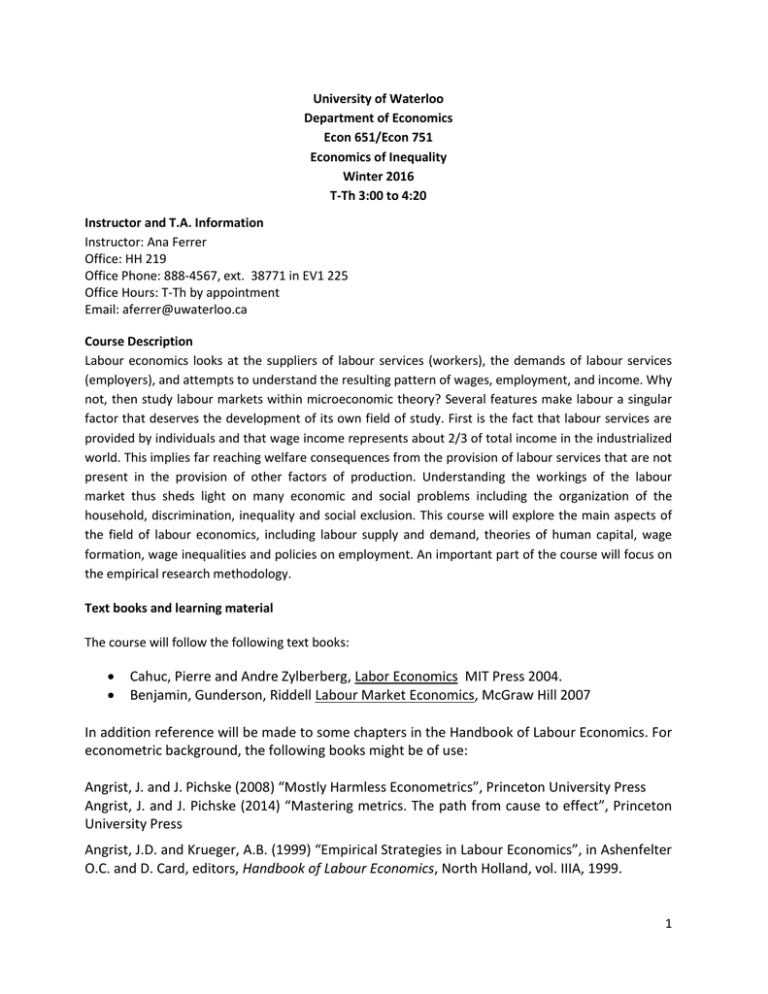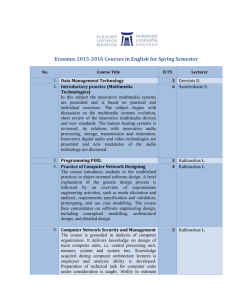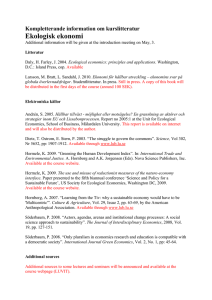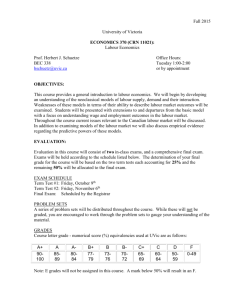Course syllabus template
advertisement

University of Waterloo Department of Economics Econ 651/Econ 751 Economics of Inequality Winter 2016 T-Th 3:00 to 4:20 Instructor and T.A. Information Instructor: Ana Ferrer Office: HH 219 Office Phone: 888-4567, ext. 38771 in EV1 225 Office Hours: T-Th by appointment Email: aferrer@uwaterloo.ca Course Description Labour economics looks at the suppliers of labour services (workers), the demands of labour services (employers), and attempts to understand the resulting pattern of wages, employment, and income. Why not, then study labour markets within microeconomic theory? Several features make labour a singular factor that deserves the development of its own field of study. First is the fact that labour services are provided by individuals and that wage income represents about 2/3 of total income in the industrialized world. This implies far reaching welfare consequences from the provision of labour services that are not present in the provision of other factors of production. Understanding the workings of the labour market thus sheds light on many economic and social problems including the organization of the household, discrimination, inequality and social exclusion. This course will explore the main aspects of the field of labour economics, including labour supply and demand, theories of human capital, wage formation, wage inequalities and policies on employment. An important part of the course will focus on the empirical research methodology. Text books and learning material The course will follow the following text books: Cahuc, Pierre and Andre Zylberberg, Labor Economics MIT Press 2004. Benjamin, Gunderson, Riddell Labour Market Economics, McGraw Hill 2007 In addition reference will be made to some chapters in the Handbook of Labour Economics. For econometric background, the following books might be of use: Angrist, J. and J. Pichske (2008) “Mostly Harmless Econometrics”, Princeton University Press Angrist, J. and J. Pichske (2014) “Mastering metrics. The path from cause to effect”, Princeton University Press Angrist, J.D. and Krueger, A.B. (1999) “Empirical Strategies in Labour Economics”, in Ashenfelter O.C. and D. Card, editors, Handbook of Labour Economics, North Holland, vol. IIIA, 1999. 1 Readings Available on LEARN TBA Course Requirements and Assessment The course will use the econometric methods typically encountered in ECON 621. We will not cover this material in class, but I will assume that you know it. Econ 651: There will be one midterm exam, 3 assignments and a final exam. Contribution to in-class discussion of papers presented is expected Econ 751: In addition to the Econ 651 requirements, students will be asked to summarize and present articles from the reading list (previous consultation with the instructor). There will be specific final exam questions for PhD students related to these articles. Assessment MA Problem Sets (4) Class participation Midterm Final Total Date of Evaluation (if known) Consult Waterloo Learn During in class presentations Consult Waterloo Learn Consult Waterloo Learn Weighting 40 10 25 25 100% Assessment PhD Problem Sets (4) Presentation/Discussion Midterm Final Total Date of Evaluation (if known) Consult Waterloo Learn Presentation Consult Waterloo Learn Consult Waterloo Learn Weighting 30 20 25 25 100% Problem Sets The assignments may be done in groups of two students in the same program (MA or PhD). Larger discussion is encouraged and you are free to discuss and attempt to solve assignment problems by consulting people from other groups. However, each group should submit a common answer that accurately reflects the group’s thought and effort. Copying solutions is not permitted. The applied sections of the homework have to be completed using Stata software. Stata tutorials are available on line to help students that are not familiar with the software. Class Participation Class participation is an important part of your learning experience. You should read the assigned papers in advance in order to contribute to in-class discussions, as well as during the presentation of seminal papers. Course Readings (Subject to change without notice) (papers in red are eligible to be presented in class as part of your class presentation grade) 1. Labour supply 2 (*) Blau, F.D. and L. M. Kahn (2007) “Changes in the Labor Supply Behavior of Married Women: 1980–2000”, Journal of Labor Economics , Vol. 25, No. 3, pp. 393-438 (*) R. Fernández, A. Fogli, C. Olivetti, (2004), “Mothers and sons: Preference formation and female labor force dynamics”, Quarterly Journal of Economics, 119 (4) pp. 1249–1299 (*) Goldin, Claudia. 2006. “The Quiet Revolution That Transformed Women’s Employment, Education, and Family,” American Economic Review, 96 (2): 1-21 2. Education Card, D. (1999) "The Causal Effects of Education on Earnings" in Ashenfelter O.C. and D. Card, editors, Handbook of Labour Economics, North Holland, vol. IIIA, 1999, chapter 27 (*) Ferrer and Riddell (2002). "The Role of Credentials in the Canadian Labor Market". Canadian Journal of Economics, November 2002; 35(4): 879-905 (*) T. Lemieux (2006) “Post-secondary Education and Increasing Wage Inequality”, AER vol 96(2) (*) B. Boudarbat, T. Lemieux and C. Riddell (2010) “The Evolution of the Returns to Human Capital in Canada, 1980–2005”, Canadian Public Policy vol. 36(1). 3. Labour demand (*) Hamermesh, D. and S. Trejo (2000), “The Demand for Hours of Labor: Direct Evidence from California”, The Review of Economics and Statistics, Vol. 82, No. 1, Pages 38-47 4. Wage formation – Wage inequalities (*) Goldin, C. and C. rouse (2000) “Orchestrating Impartiality: The Impact of "Blind" Auditions on Female Musicians”, The American Economic Review, Vol. 90, No. 4. pp. 715-741. (*) Goldin, C. (2014) “A Grand Gender convergence”, The American Economic Review, Vol. 104(4), pp. 1091-119. (*) De V. Cavalcanti, T. (2008). “Assessing the “engines of liberation”: home appliances and Female Labor force participation” Review of Economics & Statistics, 90(1), 81-88. (*) Drolet, M. “The Male-Female Wage Gap” Perspectives on Labour and Income, December 2001, pp.5-10, Statistics Canada # 75-001-XIE (*) Borjas (1987) “Self-Selection and the Earnings of Immigrants”, The American Economic Review , Vol. 77, No. 4 (Sep., 1987), pp. 531-553 (*) Borjas, G. (2003) “The Labour Demand Curve is Downward sloping: Re-examining the Impact of Immigration on the Labour Market” Quarterly Journal of Economics 118(4), (*) Card, D. "The Impact of the Muriel Boatlift on the Miami Labour Market" Aspects of Labor Market Behavior: Essays in honor of J. Vanderkamp Toronto University Press (*) Bertrand, M. and Mullainathan, S. (2004) “Are Emily and Greg More Employable that Lakisha and Jamal? A Field Experiment on Labor Market Discrimination” AER, 94(4) pp. 991-1013 3 (*) B. Boudarbat, T. Lemieux (2010) “Why are the Relative Wages of Immigrants Declining? A Distributional Approach”, CLSRN working paper 65. 5. Job search (*) Jones, S. and W. Craig Riddell (1999) “The Measurement of Unemployment: An Empirical Approach”, Econometrica, vol.67 (1) pp. 147-162 (*) Campolieti, M. (2011) “The ins and outs of unemployment in Canada, 1976-2008.” Canadian Journal of Economics, vol. 44(4), pp. 1331-1349. 6. Institutions: The Effects of Income Maintenance Schemes (*) Morissette, R. & F. Hou (2008) “Does the Labour Supply of Wives Respond to Husbands' Wages? Canadian Evidence from Micro Data and Grouped Data. The Canadian Journal of Economics vol. 41(4), pp. 1185-1210 (*) Lemieux, T. and Milligan, K. (2004) “Incentive Effects of Social Assistance: A Regression Discontinuity Approach”, NBER Working Paper # 10541 (*) Baker, B., Gruber, J. and Milligan, K. “Universal Childcare, Maternal Labour Supply and Family Wellbeing” JPE vol 116(4), 2008. http://www.nber.org/papers/w11832 (*) Brochu, P. and Green, D. 2013, “The Impact of Minimum Wages on Labour Market Transitions” , the Economic Journal vol. 123 (573), pp.1203-35 Late Work Late work will not be accepted under any circumstances. If you email your assignments, electronic documents must be in Word or pdf format. Please ensure that a readable copy reaches me in the time specified in the assignment. If the document is unreadable or cannot be opened you will get a 0 in that assignment. Electronic Device Policy Students are welcome to bring laptop computers during class. However, they are only meant to be used in a manner that is relevant to what is being taught and discussed in lectures. Browsing of the internet is not permitted as it can be extremely distracting to me and more importantly, to other students. If relevant, I will notify you whether accessing the internet during class lectures is possible. Cell phones and any other electronic device that can be used for communication with other individuals or access to the internet must be switched off Attendance Policy Please ensure that you arrive to class in time. Late arrivals are very distracting. If you consistently arrive late, I will ask you to rearrange your schedule or not come to class. Mandated Announcements 4 Economics Department Deferred Final Exam Policy Deferred Final Exam Policy found at https://uwaterloo.ca/economics/current-undergraduates/policiesand-resources/deferred-final-exam-policy. Cross-listed course Please note that a cross-listed course will count in all respective averages no matter under which rubric it has been taken. For example, a PHIL/PSCI cross-list will count in a Philosophy major average, even if the course was taken under the Political Science rubric. Academic Integrity Academic Integrity: In order to maintain a culture of academic integrity, members of the University of Waterloo are expected to promote honesty, trust, fairness, respect and responsibility. Discipline: A student is expected to know what constitutes academic integrity, to avoid committing academic offences, and to take responsibility for his/her actions. A student who is unsure whether an action constitutes an offence, or who needs help in learning how to avoid offences (e.g., plagiarism, cheating) or about “rules” for group work/collaboration should seek guidance from the course professor, academic advisor, or the Undergraduate Associate Dean. When misconduct has been found to have occurred, disciplinary penalties will be imposed under Policy 71 – Student Discipline. For information on categories of offenses and types of penalties, students should refer to Policy 71 - Student Discipline (https://uwaterloo.ca/secretariat-general-counsel/policies-procedures-guidelines/policy-71) Grievance: A student who believes that a decision affecting some aspect of his/her university life has been unfair or unreasonable may have grounds for initiating a grievance. Read Policy 70 - Student Petitions and Grievances (https://uwaterloo.ca/secretariat-general-counsel/policies-proceduresguidelines/policy-70), Section 4. Appeals: A student may appeal the finding and/or penalty in a decision made under Policy 70 - Student Petitions and Grievances (other than regarding a petition) or Policy 71 - Student Discipline if a ground for an appeal can be established. Read Policy 72 - Student Appeals (https://uwaterloo.ca/secretariatgeneral-counsel/policies-procedures-guidelines/policy-72). Other sources of information for students: Academic Integrity website (Arts) https://uwaterloo.ca/arts/current-undergraduates/student-support/ethical-behaviour Academic Integrity Office (UWaterloo) https://uwaterloo.ca/academic-integrity/ Accommodation for Students with Disabilities Note for students with disabilities: The AccessAbility Services office (https://uwaterloo.ca/disabilityservices), located on the first floor of the Needles Hall extension, collaborates with all academic departments to arrange appropriate accommodations for students with disabilities without compromising the academic integrity of the curriculum. If you require academic accommodations to lessen the impact of your disability, please register with the AS office at the beginning of each academic term. If you are using Turnitin in your course 5 Turnitin.com: Plagiarism detection software (Turnitin) will be used to screen assignments in this course. This is being done to verify that use of all material and sources in assignments is documented. In the first week of the term, details will be provided about the arrangements for the use of Turnitin in this course. Note: students must be given a reasonable option if they do not want to have their assignment screened by Turnitin. See Turnitin at Waterloo for more information. (https://uwaterloo.ca/academicintegrity/integrity-waterloo-faculty/turnitin-waterloo) 6








